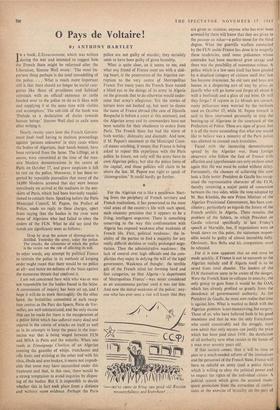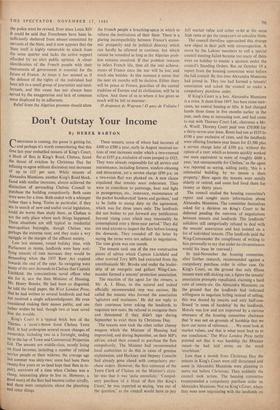0 Pays de Voltaire!
By ANTHONY HARTLEY N a book, L'Enracinement, which was written I during the war and intended to suggest how the French State might be reformed after the Liberation, Simone Well wrote : 'The most im- portant thing perhaps is the total remodelling of the police. . . . What is much more important still is that there should no longer be social cate- gories like those of prostitutes and habitual criminals with an official existence as cattle handed over to the police to do as it likes with and supplying it at the same time with victims and accomplices.' The sub-title of the book-was 'Prelude to a declaration of duties towards human beings.' Simone Weil died in exile soon after writing it. the war and intended to suggest how the French State might be reformed after the Liberation, Simone Well wrote : 'The most im- portant thing perhaps is the total remodelling of the police. . . . What is much more important still is that there should no longer be social cate- gories like those of prostitutes and habitual criminals with an official existence as cattle handed over to the police to do as it likes with and supplying it at the same time with victims and accomplices.' The sub-title of the book-was 'Prelude to a declaration of duties towards human beings.' Simone Weil died in exile soon after writing it.
Nearly twenty years later the French Govern- ment finds itself having to institute proceedings against 'persons unknown' in sixty cases where the bodies of Algerians, their hands bound, have been retrieved from the Seine. The killings, so it seems, were committed at the time of the mas- sive Moslem demonstrations in the centre of Paris on October 17, and grave suspicion is felt to rest on the police. Moreover, it has been re- ported by reputable journalists that many of the 14,000 Moslems arrested that day were beaten mercilessly on arrival at the stadiums in the out- skirts of Paris, which had been hurriedly requisi- tioned to contain them. Speaking before the Paris Municipal Council, M. Papon, the Prefect of Police, made no reply to these charges, apart from saying that the bodies in the river were those of Algerians who had failed to obey the orders of the FLN. What he did say (and the words are significant) went as follows : Drop by drop the poison of disintegration is distilled. Yesterday the army, today the police. The attacks, the calumnies of which the police is the victim run the risk of affecting its will.
In other words, any attempt by political France to restrain the police in its methods of keeping order might mean that there would be no police at all—and hence no defence of the State against the numerous threats that confront it.
I am not concerned here with who was or was not responsible for the bodies found in the Seine. A commission of inquiry has been set up, and I hope it will do its work thoroughly. On the other hand, the brutalities committed at such recep- tion centres as the Parc des Sports, Porte de Ver- sailles, are well substantiated, and the only excuse that can be made for them is the exasperation of a police force which has suffered many dead and injured in the course of attacks on itself as well as in its attempts to keep the peace in the inter- necine war that is being waged between FLN and MNA in Paris and the suburbs. When one reads in Temoignage Chrdtien of an Algerian running the gauntlet of whips, truncheons and rifle butts and arriving at the other end with his tibia, fibula and arm broken, it seems not improb- able that some may have succumbed under this treatment and that, in this case, there would be a strong temptation to avoid inquiries by dispos- ing of the bodies. But it is impossible to decide whether this in fact took place from a distance and without more evidence. Perhaps the Paris police are not guilty of murder; they certainly seem to have been guilty of gross brutality.
What is quite clear, so it seems to me, and what any friend of France must see with a sink- ing heart, is the penetration of the Algerian cor- ruption to the very centre of Metropolitan France. For many years the French State turned a blind eye to the doings of its army in Algeria on the grounds that to do otherwise would under- mine that army's allegiance. Yet the stories of torture were not hushed up, but went to shame the name of France abroad (the case of Djaniila Boupacha is before a court at this moment), and the Algerian army and its commanders have not been notable for their obedience to orders from Paris. The French State has had the worst of both worlds: disloyalty and discredit. And now, if M. Papon's statement to the Municipal Coun- cil means anything, it means that France is being asked to repeat this experience with the Paris police. In future, not only will the army have its own Algerian policy, but also the police force of the capital, and those policies will claim to be above the law. M. Papon was right to speak of 'disintegration.' It could hardly go further.
For the Algerian rot is like a pestilence. Start- ing from the periphery of French territory and French institutions, it has penetrated to the most vital areas of the country's life with such speed, such uncanny precision that it appears to be a living, intelligent organism. There is something unnerving in the way this confrontation with Algeria has exposed weakness after weakness of French life. First, political weakness: the in- ability of the parties to find a majority for any really difficult decision or really prolonged nego- tiation. Then the administrative weakness: the lack of control over high officials and the com- plicities they enjoy in defying the will of the legal government. Weakness of thought: the terrible gift of the French mind for forming hard and fast categories, so that Algeria—`a department of Metropolitan France'—was never considered as an autonomous partner until it was too late. And now the moral weakness of the police: any- one who has ever seen a riot will know that they '—we've come to bring you good old Russian resourcefulness and knowhow! . . are given to violence; anyone who has ever been arrested by them will know that they are given to the passage an tabac—a polite name for the third degree. What the guerrilla warfare conducted by the FLN inside France has done is to magnify these tendencies, until some policemen %%hose comrades had been murdered grew savage and there was the possibility of monstrous crimes. A police which is a law unto itself has been goaded by a despised category of citizens until that law has become draconian. So old men and boys are beaten in a despairing sort of way by pores de tamale who will go home and forget all about it with a beefsteak and a glass of red wine. Or will they forget? If reports in Le Monde are correct, many policemen were worried by the methods used on October 17, while M. Papon himself is said to have intervened personally to stop the beating-up of Algerians in the courtyard of the Prefecture of Police. These are signs of grace, but it is all the more astonishing that what one would like to believe was a minority of the Paris police was allowed to commit such brutalities.
'Faced with the increasing demoralisation spread by the Algerian war, those foreign observers who follow the fate of France with affection and apprehension can only exclaim once again that the war must be ended without delay. Fortunately, the chances of achieving this now look a little better. President de Gaulle has recog- nised the representative character of the FLN, thereby removing a major point of contention between the two sides, while the tone adopted by M. Ben Khedda, the new Prime Minister of the Algerian Provisional Government, has been con- ciliatory, particularly as regards the future of the French settleh in Algeria. There remains the problem of the Sahara, to which President de Gaulle referred specifically in last Friday's speech at Marseille, but, if negotiations were to break down on this point, the statesmen respon- sible would be guilty of almost incredible folly. Obviously, Ben Bella and his companions must be released.
For it is now apparent that an end must be made quickly, if France is not to succumb to the Algerian malady and if Algeria itself is to be saved from total disaster. The leaders of the FLN themselves seem to be aware of the danger. Were the French State to collapse in anarchy, the only group to gain from it would be the OAS, which has already profited so greatly from the decadence of governmental authority. As for President de Gaulle, he must now realise that time is against him. What is wanted to finish with the Algerian problem is not manoeuvring, but surgery. Those of us, who have believed both in his good intentions and that he was the only Frenchman who could conceivably end the struggle, must now admit that only success can justify the price which has been paid since 1958: the dereliction of all authority save what resides in the hands of a man over seventy years old.
If that success comes, then it 'will be time to pass to a much-needed reform of the institutions and the personnel of the French State. France will have to rebuild an army (and a police force) which is willing to obey the political power and to respect the rights of the individual citizen. A judicial system which gives the accused inade- quate protection from the extraction of confes- sions or the exercise of brutality on the part of the police must be revised. Ever since Louis XIV it could be said that Frenchmen have been in- sufficiently sheltered from abuses committed by servants of the State, and it now appears that the State itself is highly vulnerable to attack from the same quarter and lacks the active support afforded by an alert public opinion. A closer identification of the French people with their instruments of government is essential for the future of France. At times it has seemed as if the defence of the rights of the individual had been left to a small group of journalists and intel- lectuals, and this cause has not always been served by the exaggeration and lack of common sense displayed by its adherents.
Relief from the Algerian pressure should allow the French people a breathing-space in which to reform the institutions of their State. There is a glaring incompatibility between France's econo- mic prosperity and its political disarray which can hardly be allowed to continue, but which cannot be remedied as long as the Algerian prob- lem remains unsolved. If that problem remains to infect French life, then all the real achieve- ments of France since the war will be lost, and much else besides. At this moment it seems that the next six months will be decisive. Either there will be peace or France, guardian of the central tradition of Europe and its civilisation, will be in eclipse. And those of us to whom it has given so much will be left to murmur : 0 drapeaux de Wagram ! 0 pays de Voltaire !







































 Previous page
Previous page